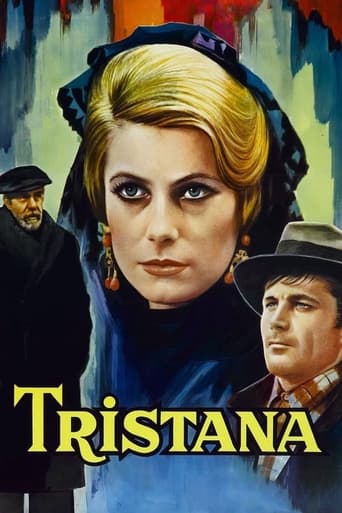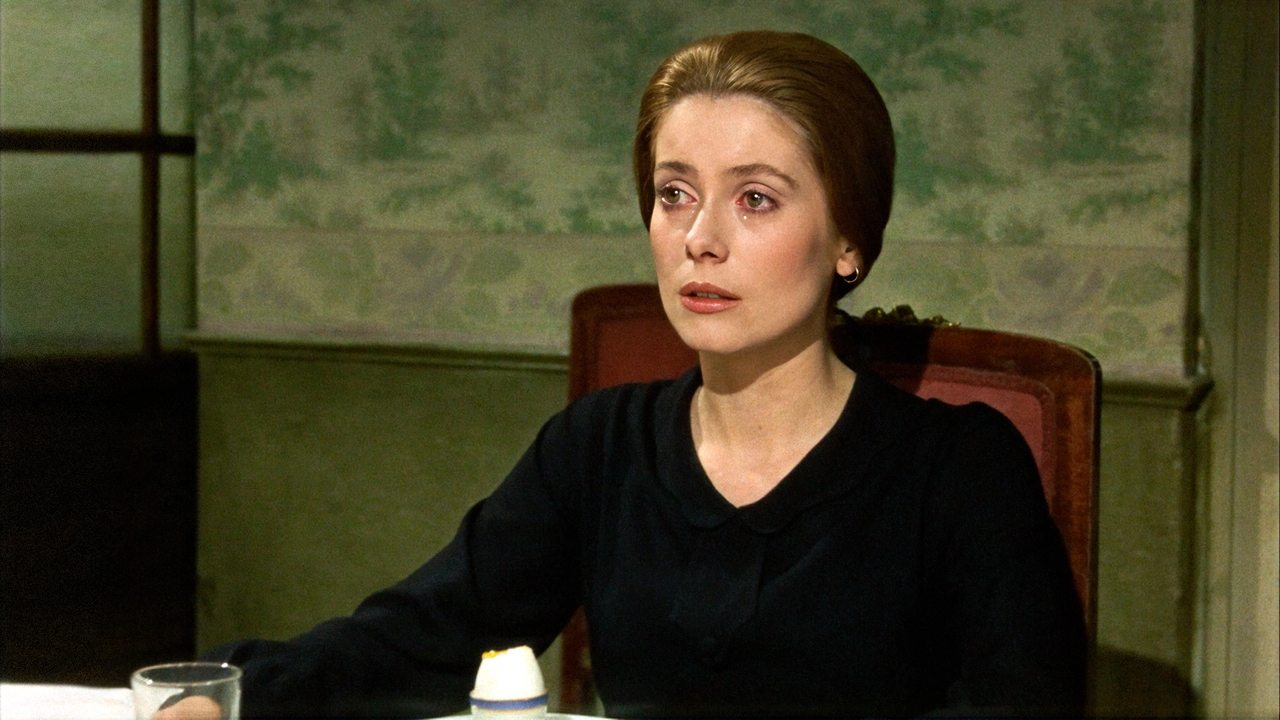Musashi94
Tristana is a bit of an odd duck in the Luis Buñuel filmography. While the plot feels right up his alley (respected aging aristocrat seduces his ward, leading to conflict when she falls in love with a younger man) there were times were I was wondering if I was really watching a Buñuel film. The director's trademark surrealism is largely absent here aside from a brief dream sequence. All in all, it's solid enough, but not really one of Buñuel's best.In many respects, and rather unusually for Buñuel, this is an actor's film. Fernando Rey and Catherine Deneuve are both exceptional as the aging Don Lope and his ward Tristana, respectively. Rey's performance in particular is one of his finest. His character is probably the highlight of the film, he's very multifaceted and doesn't fall into the typical stereotypes that Buñuel uses to portray bourgeoisie characters. The third main lead, Franco Nero of Django fame, is a bit stiff here but he's not on screen very much compared to the other two leads. Finally, Lola Gaos heads the supporting cast and does a terrific job as Don Lope's housemaid Saturna.Because this is such an actor's film, Buñuel's direction is a bit flat for the most part. He gets a bit creative at the beginning and end of the film but he's a nonentity for the middle portion of the film, which drags on a bit as a result. Aside from the use of snow towards the end, the film isn't much to look at and the cinematography is a little flat at times. The sound design is also rather spartan, there's no score and not much to listen to aside from the dialogue. The effects used to convey one character having their leg amputated are well done however, and the costumes and sets feel very authentic and one never gets the sense that the sense that this historical drama feels staged.In conclusion, the film is definitely worth seeing for Rey and Deneuve's performances but this isn't the first Buñuel I'd show someone who's never seen a film of his as while it is more accessible, it lacks his usual distinctive style and in general isn't one of his stronger works.
Movie Critic
I must have watched a different movie than the reviewers who call this "the top movie of all time" a 10 plus and so forth.First of all dubbing robs 90% of an actor's abilities and the two main characters are dubbed De Neuve and Fernando Rey..it sounds like a spaghetti western. Also the many times used theme of a Gigi like uncle who falls in love with his niece (charge in this case) is not shocking or particularly interesting. Zola used it in Dr. Pascal.As another reviewer states this is a novel turned into a movie so all the changes that occur in DeNeuve seem too abrupt as they try to pack 300 pages into an hour and half. Suddenly Tristana is a bitter woman....from an innocent girl. Also please if this is a world quality movie why did the director use that tired old technique of showing the hands only when Tristana is playing the piano. Also although very minor there were slip ups in the time editing...a modern car can be seen in the back ground of one of the scenes and the train lines were electrified.I am sure the movie can be micro-analyzed for symbolism and visual cues..on the door of the apartment they live in is the faint white scrawl of a man's face and so forth (death?).I am sure it is flawless in this way...but as far a convincing as to why DeNeuve turns jaded it just doesn't work well---the dubbing and the abruptness mainly...I did find the main character's hypocrisy good a socialist ordering glazed maroons and living the high life....although in a leftie directors eyes this may not have been intended to be hypocrisy but rather showing his sophistication. God knows that is quite possible.I did not quite understand the deaf young men's symbolism. Didn't find it worth speculating on.DO NOT RECOMMEND
Imdbidia
Tristana is a Buñuel's film based on Benito Perez Galdos' realist novel of the same title, what Spaniards call a "novela costumbrista", that is, an epoch novel that focus on real local customs, social types and atmosphere.It tells the story of Tristana, a 19y.o. orphan girl, who moves to the house of her legal guardian, Don Lope, a socialist bourgeois womanizer, who becomes not only her father, but also her lover-husband.The way Buñuel shot the movie is not especially daring or original within Spanish cinema, and, despite what some people say, there is not surrealism in this movie, just some oniric images - two very different things that people mix too often. What makes the movie so interesting is not the realist way in which depicts 19th Spanish society (there are many movies of this sort in Spanish cinema), but how Buñuel approaches and modifies the story to bring out Tristana's dark side. The movie ends exploring the boundaries and limits of the economical, social, and gender orders, and, more importantly, the boundaries between good and evil. The story also shows the hypocrisy of the bourgeoisie, that preaches Socialist ideas and criticize wealth and the social order, despite them being wealthy, being part of that system and direct beneficiaries of the order they criticize.In fact, in Tristana nothing is what it looks like, everything has two sides, there is not good and evil, but good-and-evil. The viewer starts despising and hating that indecent abuser of Don Lope, for his social hypocrisy and his sexual behavior, forgetting that young Tristana, despite despising him, does not oppose or resist his sexual advances, and lives like a princess from his money being as hypocrite as her master. A little intermezzo contains her meeting, love story, and escape with young bohemian painter Horacio. The viewer feels that this should be the end of the movie, the poor girl rescued by pure love. Mistake! - The second part of the movie, shows Tristana's true nature. She is sick and misses Don Lope and his wealth, so she leaves her lover and returns to Don Lope's house, and even marries him; he becomes her carer and dutiful husband. If Don Lope is a monster and treated her so badly why would she want to return to his place? She has soaked in all the preaching of his father-husband and uses them against him; she becomes the tyrant, the intolerant, the abuser, and the one that takes advantage of the old tamed Don Lope, who changes his behavior and customs to suit Tristana's needs and whims. Tristana ends being Don Lope's mirror image in reverse, a product of his teachings, but also a more wicked human being only interested in money, power, and revenge. The viewer ends thinking that nothing is what it looked like, and that both Don Lope and Tristana are connected to the core, identical in a way, evil both of them.As always, Buñuel is a master at directing actors and creating an homogeneous ensemble of a group of big movie stars. Fernando Rey really nails his role, and offers a convincing range of emotions and behavior, from father to jealous father, from stallion to grandpa, from an open-minded intellectual to a petty tyrant, from funny guy to a jerk. Catherine Denueve is great in a role that suited her acting abilities, and her cold beauty is perfect for Tristana. Lola Gaos is great, as always, in her role of submissive hard-working servant, hard and sweet at the same time. The rest of the cast, which includes Franco Nero, Antonio Casas, and Jesus Fernandez, among many other supporting actors, are also good in their respective roles.Not the best or most experimental Buñuel's movie, but very intriguing, with terrific performances, that offers an accurate portrait of Spain in the 19th century and explores controversial philosophical themes.
Galina
Sometimes hilarious, often dream like surreal drama tells about a young woman, heavenly beautiful and innocent in the beginning, bitter and pitiless but still heavenly beautiful sans one leg in the end. Catherine Deneuve gave perhaps her best performance as an orphaned 19 years old girl who after her mother's death has been adapted by the aristocratic free-thinking atheist, Don Lope Garrido in absolutely fantastic performance by Bunuel's favorite leading man in the latter half of the director's career, Fernando Rey (That Obscure Object of Desire, The Discreet Charm of the Bourgeoisie, Tristana, Viridiana). Don Lope is a man of honor, a gentleman who believes in those of ten commandments that don't have to do with sex. He also takes pride in having not worked a day in his life because the only work is noble that is done "with pleasure". He rather would sell for a fraction of their real cost the pieces of art that had belonged to his family for generations. This is the man Tristana comes to live with. Very soon he would seduce her and make her his mistress justifying it with the words that she is better off this way than being on the streets. Don Lope is a preacher of freedom in the relationships between a man and a woman and for him, "marital bliss has sickly odor". Young Tristana is a good student and eventually she chooses to leave Don Lope and to run off with a young and attractive artist (Franco Nero). From this point on, the movie takes an unexpected and unusual turn..."Tristana", based on a famous romance novel written by Benito Perez Galdos was adapted by Bunuel into simple on the surface but incredibly rich, complex, funny, in one word, brilliant dissection of moral degradation as only Bunuel could make it. The film is also a portrayal of a strong and beautiful woman who wishes to survive and be independent even if it goes against the established rules of behavior of her time.P.S. I wonder if Rainer Werner Fassbinder had seen "Tristana" and if he had, would it give him any ideas about his own trilogy of strong, beautiful, independent, and corrupted women trying to survive in the post-war Germany?


 AD
AD






